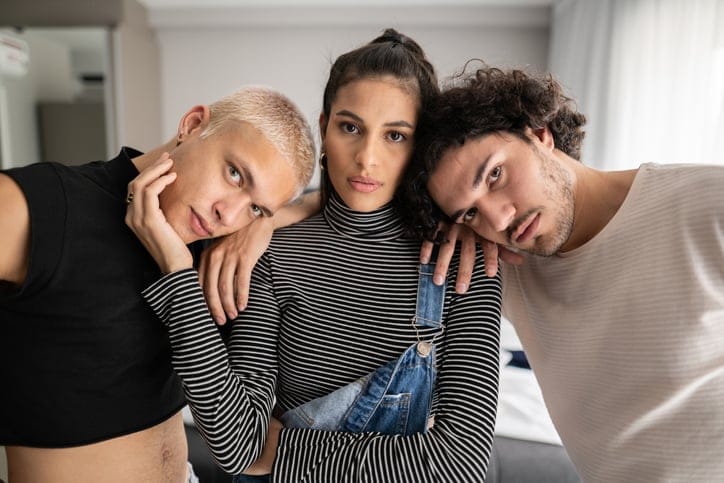If there’s one term that’s likely to divide people in the modern day, it’s polyamory. Some say it’s sinful, others say it’s the best thing since sliced bread. For the good, the bad, and the ugly, read on for an insight into polyamory and its effects on dating.
Positive ways polyamory has changed dating
- It recontextualizes consent. Consent in the modern day has gained a new lease on life. It’s essential for monogamous relationships, let alone polyamorous. The stakes are higher when there are more people involved — that’s just a logistical reality. It also means that consent becomes a bigger and more nuanced concept. Consent adds to the polyamorous relationship rather than restricting it, and it’s an essential form of communication and trust in a relationship with multiple people.
- It changes the meaning of boundaries. Once upon a time, talking about sexual or personal boundaries was the punchline in an SNL skit, but now it has emotional credibility. It also demonstrates why personal boundaries are sacred in polyamorous dating and relationships. When multiple people are involved in a relationship, or when relationships that were previously monogamous open up to other people, well-communicated boundaries are essential. It makes sure people know each other’s expectations and keeps them accountable. There’s no flimsy “I didn’t know that was how you defined cheating” excuses here, nor any “we were on a break” lines. That was for you, Ross.
- It’s extremely sex-positive. The proliferation of polyamory in the media and in society, and its wider acceptance into these streams, has encouraged a pleasure-first movement in sex and dating. It’s no longer focused solely on the heterosexual, monogamous, straight relationship trajectory of dating-married-house-kids. Instead, both horizontal and vertical movements are encouraged, which allows for more sexual and emotional experimentation. That’s good news for all forms of fulfillment.
- We can assert our needs more clearly. It’s not as simple as just asking what’s wrong after work and letting your partner reply “fine” without questioning that further. In a world where multiple people, perspectives, and contexts are involved and need to be managed, effective, and meaningful conversation is paramount. When you’re feeling stressed at work, or when there is an issue with a relationship boundary, it’s important to have a channel of communication to clearly express those needs. Sometimes you will need space and have to ask for it.
- Sexual education improves. I can see this even in the sex-positive language surrounding sex. Yes, starting a family is really important, but when that isn’t the primary purpose of having sex, you can explore what really makes you tick. You’re also more likely to get your sexual needs met by having multiple partners. It’s just the law of averages! You can then pass on your gained experience and spread that virtuous cycle. Polyamory in dating aids in this process.
- Successful relationships are meant to look different. First of all, polyamory reminds us all that success looks different in all relationships. Secondly, the more traditional relationships are the least flexible. Polyamory has taught us, for better, how to realize we deserve more and encourages us to pursue more compatible partners.
The downsides of polyamory
- Traditionalists are confused and angry. It might be that a person of a certain generation, used to a certain image of how relationships look, isn’t prepared to meet the modern world where it is. However, expecting an entire generation to respond on a dime to a totally new culture, is also unrealistic and cruel. Give people space to react to change otherwise they will push back, and that’s where things get heated. Polyamory in dating is a choice, not a requirement. Let people do what they want as long as they’re not hurting anyone.
- Problems arise when you’re not on the same page. When entering into the modern world, there is an unspoken expectation that you’re all on the same level of emotional and intellectual understanding. But, if you aren’t all as self-realized or educated, you’re more likely to disappoint each other. That’s a tough pill to swallow. We haven’t been publically having multiple partners for all that long, so there will be some learning curves and lots of people’s feelings will get hurt as a result.
- There’s pressure to adapt. This is a problem with polyamory in dating and relationships. Even if you believe you’re pretty comfortable in your sexuality and monogamous relationship, you might feel external peer pressure to explore new things. Yes, that’s good in principle, but unless you’re naturally curious, this enforced new culture can confuse more people than it educates.
- People might use polyamory as an excuse for cheating. These people wouldn’t be practicing polyamory in the spirit of openness and communication in which it is founded, but this is nonetheless a hidden problem. Even if the terms of cheating are outlined clearly, or even when people in the relationship agree to open it up to other people, those feelings might still get hurt. Good relationships will perish in the service of experimenting with polyamory because it seemed like the cool thing to do.
- There is pressure on the “main relationship.” Even the fact of there being a “main” or “core” relationship is tricky. If a once-monogamous relationship opens up, or if certain people in the relationship have been together longer, it creates a ‘first-second’ dynamic. Far from the spirit of equality and openness that polyamory seeks to be, it actually creates a hierarchy. That can be really exhausting.
- There are new legal issues that our society cannot support. For every new relationship type, there is a unique or unprecedented issue that cannot be resolved with the existing legal frameworks. What about custody arrangements, or other tricky questions? That is the bad side of polyamory – that it can’t yet answer all the questions it asks of the world. I will be staying tuned.




